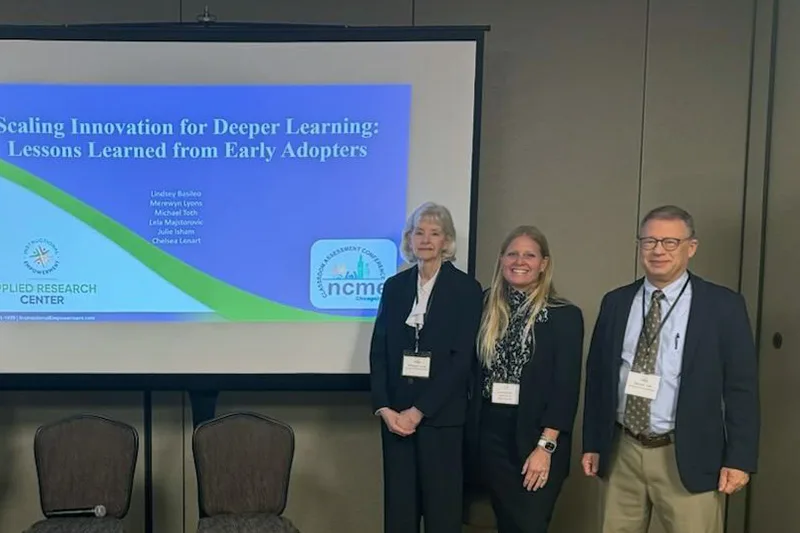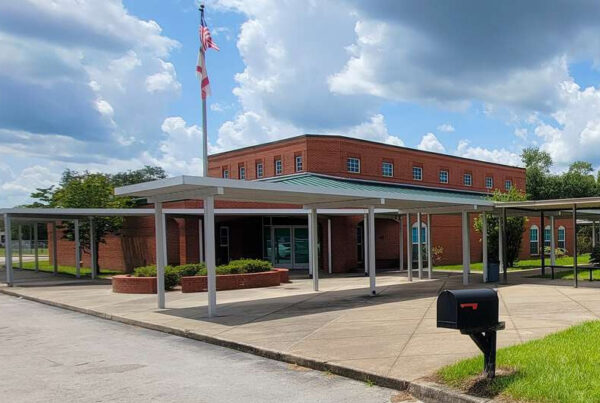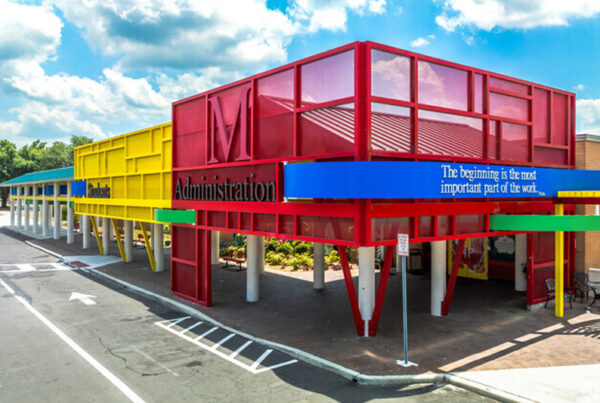
Dr. Merewyn E. “Libba” Lyons (left), Dr. Lindsey Devers Basileo (center), and Michael D. Toth (right) presented research findings from the Applied Research Center on how early adopters in education scale innovation for deeper learning.
In this interview, Dr. Merewyn E. “Libba” Lyons, Senior Research Analyst at Instructional Empowerment’s Applied Research Center, discusses the research behind deeper learning and its transformative impact on student success.
How Does Instructional Empowerment’s Applied Research Center Define Deeper Learning, and Why Is it Critical for Student Success?
We define deeper learning as the outcome of all students developing into leaders of their own learning. They become these leaders as they grow more skilled at collaborating in teams, engaging in rich academic discourse, and tackling rigorous tasks that prepare them for both academic and real-world success. Deeper learning creates expert learners for life.
Deeper learning creates expert learners for life.
How Does Deeper Learning Impact Students from Special Populations, Such as English Learners, Students with Disabilities, and/or Students from Lower Socioeconomic Backgrounds?
Years of empirical research have shown that students with disabilities are capable of attaining essential skills of deeper learning: critical thinking, solving complex problems, collaboration, and effective communication. We know that teachers of students with disabilities have been proponents of deeper learning for a long time and have pioneered many strategies to build these skills. Classrooms implementing the Model of Instruction for Deeper Learning make it possible for students with disabilities to be fully integrated in learning teams with their peers and to develop these skills.
As for English Learners, the Model of Instruction for Deeper Learning allows them to participate fully in rigorous, grade-level learning in collaboration with English-speaking peers. This accelerates the development of academic vocabulary and fluency in English while providing them the opportunity to build on the knowledge and skills they have acquired in their home languages.
For students from lower socioeconomic backgrounds, the Model of Instruction for Deeper Learning gives them opportunities for deeper learning that they do not normally experience in Title 1 schools but are common for more affluent students. The Model of Instruction for Deeper Learning builds their sense of agency as it develops the cognitive, interpersonal, and intrapersonal skills of deeper learning that will allow them to attain upward mobility as adults.
How Does Deeper Learning Influence Student Agency?
Agency refers to people’s ability to influence the circumstances of their lives and make deliberate and intentional changes to achieve goals that are meaningful to them. For our students, agency means taking charge and becoming leaders of their own learning – guided by worthy goals toward which they plan, organize, reflect on their progress, and persist until they achieve them.
Deeper learning cannot happen without agency, but agency only grows when students have opportunities for deeper learning. So deeper learning and agency reinforce and build on each other.
How Does the Science of Deeper Learning Support Instructional Empowerment’s Mission to End Generational Poverty and Close Achievement Gaps?
Nobel Laureate economist Amartya Sen states that agency is the key to ending generational poverty. We use the pedagogy of deeper learning to build student agency and equip them with the knowledge and skills they need to break this cycle and attain upward mobility. Deeper learning leads to the acquisition of strong foundations of academic knowledge and skills that translate to higher performance in school and on assessments of learning.
Deeper learning leads to the acquisition of strong foundations of academic knowledge and skills that translate to higher performance in school and on assessments of learning.
Subscribe for curated education insights delivered every two weeks.
What Are the Outcomes When Students Engage in Deeper Learning?
Deeper learning results in total engagement and immersion in learning. Students find it challenging but enjoyable as they grapple with and master complex ideas and problems. They relish the comradeship of their teammates as they work together, debate, encounter and overcome obstacles to reach their learning goals. The experience of deeper learning is intrinsically motivating to them – something they pursue for the sheer joy and interest of it.
Partner School Example: Woonsocket High School
Prior to implementing the Model of Instruction for Deeper Learning in her classroom, Woonsocket High School educator Morgan Zinni recognized that students were struggling to take accountability for their learning. “I felt a little bit in a rut with my students,” she shared. After working with an Innovation Specialist – a role designated by the Woonsocket Education Department to support educators in implementing the Model of Instruction for Deeper Learning – Zinni saw a shift in students:
“For students to get to that next level in their learning, they have to come up with their own thinking, share it, debate it, and analyze it. The Model of Instruction for Deeper Learning has been really instrumental in facilitating that.”
– Morgan Zinni, Teacher, Woonsocket High School, Rhode Island
How Does This Differ from Traditional Psychological Theories on Learning and Education?
I just mentioned intrinsic motivation, and that is probably the biggest difference in how we approach teaching and learning. Traditionally, teachers have learned in pre-service educational psychology courses how to incentivize learning through external motivators, such as praise and rewards, and discourage bad behavior through negative consequences and punishments.
But decades of research has consistently shown that appealing to students’ intrinsic motivation results in deeper, sustained learning that students can readily apply to new contexts and problems. It also results in higher levels of academic achievement reflected in students’ grades and performance on assessments. External motivation results in surface, highly transitory learning. In the long run, student motivation to learn diminishes and their academic performance suffers.
When we provide learning opportunities that allow students to exercise increasing levels of autonomy, that provide evidence that they are making progress as learners, and that allow them to develop strong, supportive relationships with their classmates and teacher, we are fostering high levels of intrinsic motivation.
How Do You Think a Focus on Deeper Learning Will Impact the Future of Education?
I think deeper learning is the future of education. Knowledge is expanding exponentially, and technology is rapidly evolving. Our students must acquire the knowledge, skills, and agency they need to live productive lives in a world that is changing in unpredictable ways. The only way to prepare them for this world is through deeper learning.
Our students must acquire the knowledge, skills, and agency they need to live productive lives in a world that is changing in unpredictable ways. The only way to prepare them for this world is through deeper learning.
What Advice Would You Give Educators Looking to Implement a Deeper Learning Approach in Their Schools?
First, read the research. The National Academies of Sciences, Engineering, and Medicine have published three downloadable books that provide a comprehensive background on deeper learning and how to achieve it:
- Education for Life and Work: Developing Transferable Knowledge and Skills in the 21st Century (2012) https://nap.nationalacademies.org/catalog/13398/education-for-life-and-work-developing-transferable-knowledge-and-skills
- How People Learn: Brain, Mind, Experience, and School: Expanded Edition (2000) https://nap.nationalacademies.org/catalog/9853/how-people-learn-brain-mind-experience-and-school-expanded-edition
- How People Learn II: Learners, Contexts, and Cultures (2018) https://nap.nationalacademies.org/catalog/24783/how-people-learn-ii-learners-contexts-and-cultures
Next, please contact us. We are driven by our mission to end generational poverty and eliminate achievement gaps. The pathway to accomplishing that mission is redesigned, rigorous Tier 1 instruction – our Model of Instruction – that ensures deeper learning for all students. The only way there is through strong partnerships with likeminded educators.
About the Model of Instruction for Deeper Learning
There has always been deeper learning for some students – but not for all students in every classroom, every day. Now it is possible with the research-based Model of Instruction for Deeper Learning™, which provides every teacher and all students with the professional learning, support, and resources to achieve deeper, more rigorous learning of the curriculum.
The Model of Instruction for Deeper Learning places students at the center of their learning, shifting from traditional teacher-directed methods to student-led team learning. In this approach, students collaborate in structured, interdependent teams, guided by clear roles and responsibilities. Unlike traditional grouping, this approach ensures equal participation and accountability – fostering deeper understanding, critical thinking, and collaboration.
We guide you through the process, starting with a well-designed pilot involving volunteer principals and teachers, then scaling success to meet the district’s goals, timeline, and resources.
About the Author
Dr. Merewyn Lyons
Dr. Merewyn Lyons is a Senior Research Analyst with Instructional Empowerment’s Applied Research Center. Her primary research interest is educational psychology, with a focus on understanding the effect of motivation on teaching, learning, and educational leadership. She is co-author of peer reviewed articles in Frontiers in Education, Quality Education for All, and Sage Open. Dr. Lyons is a member of the Center for Self-Determination Theory, the American Educational Research Association, and the European Association for Research on Learning and Instruction. She is also a retired officer of the United States Navy and a retired K-12 educator.
Subscribe for curated education insights delivered every two weeks.
About Instructional Empowerment
Our mission is to end generational poverty and eliminate achievement gaps through redesigned rigorous Tier 1 Instruction that ensures deeper learning for ALL students.




